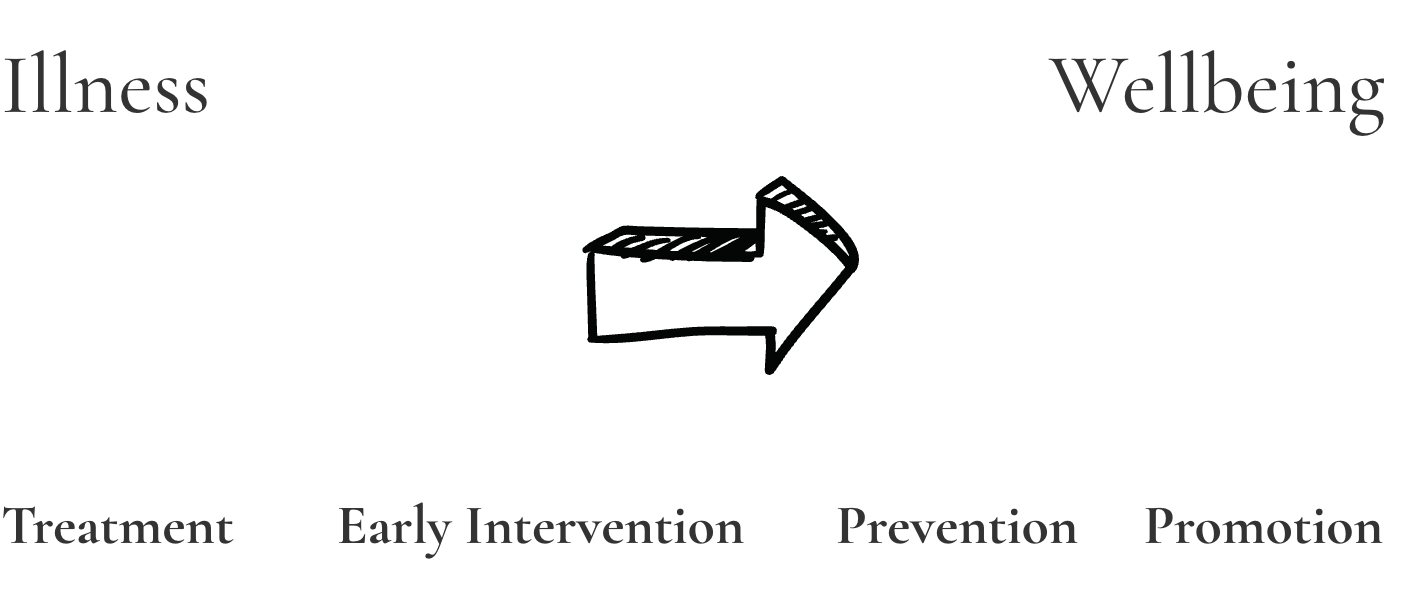The Global Wellness Institute defines wellness as “the active pursuit of activities, choices and lifestyles that lead to a state of holistic health”.
Wellness is an intentional, self-directed and evolving process with the goal of achieving your full potential. Wellness is multidimensional and holistic, encompassing lifestyle, mental, physical and spiritual well-being, workplace and the environment.
There are many definitions of wellness but most include these 6 elements:
Physical: Nourishing a healthy body through sleep, nutrition, exercise, self-care etc.
Emotional: Being aware of, accepting and expressing our feelings, and understanding, sitting with and validating the feelings of others.
Mental: Engaging in the world through learning, creativity and problem-solving etc.
Social: Connecting and relating to others and our communities in meaningful ways.
Spiritual: Finding meaning and higher purpose in human existence. This may include living a life in alignment with our values and beliefs.
Environmental: Engaging in positive interrelationships between environmental health and human actions, choices and wellbeing.
One way to understand wellness is to consider mental health or health as a continuum that extends from illness to a state of optimal wellbeing. And alongside this runs a continuum from treatment to prevention.

On one end, for example someone experiencing a depressive episode may require more intensive treatment such as seeing a psychologist for weekly therapy or taking anti-depressants prescribed by their GP or Psychiatrist. At this stage of initial treatment the goal may be on improving mental health by reducing suffering, i.e., that the person feels less depressed and is not experiencing the many associated symptoms of depression such as fatigue and sleep difficulties.
On the opposite end, people are proactively focussed on prevention and maximizing their vitality. They pursue lifestyles and adopt attitudes that not only prevent disease, but promote good mental health and health. The goal is to improve their overall sense of wellbeing and enhance their quality of life.
In other words, wellness is preventive, proactive and driven by self-responsibility. Ultimately, a solid foundation of wellness helps to prevent and overcome disease, both in the present, as well as in the future. Wellness also positively impacts how we live with illness and live a full and meaningful life.
Wellness is often used interchangeably with a range of other terminology such as wellbeing, health and happiness. While they share elements, wellness is unique in that it does not simply refer to a static state of being (i.e., state of wellbeing, being happy, or in good health). Rather, wellness is an active process of awareness and intent - making choices that move us toward our optimal holistic health and wellbeing.
I love the word wellness as personally the way I connect with the word is it is that it is outcome and process. It’s empowering because it represents the concept that we have the power to transform our lives. Whether we are healthy or living with disease. It gives the power back to the individual and I think ultimately this is what psychology is all about.
We often explain to clients who are new to therapy, that we may be the expert in psychology and as such have knowledge and strategies that are helpful to others, but ultimately the individual is the expert in themselves. It is a collaborative process- similar to a coach on the field who is providing the framework for skill development but ultimately it is the player on the field that scores the goal. Only you can achieve your desired outcome.
As psychologists we are acutely aware of the impact mental health can have on individuals, families and communities. Unfortunately, mental
health difficulties appear to be increasing - with the ongoing impacts of “the COVID years”, global issues and financial strain. We know
that there will always be people who need to access the support of a psychologist and psychologists will be there to offer that support. But
so much of what we see is ultimately preventable. If people had access to the right information, resources and support at the right time, in
the right place, in the right format in many instances we can prevent the onset of mental illness.

We’ve all heard the saying “prevention is better than a cure”, well this is the essence of wellness. Wellness relies on the individual to take meaningful action.
- Identify your goal: Consider the different areas of wellness above and identify which area/s you want to focus on first. Don’t overthink it, whatever you choose will likely positively impact on other areas.
- Start simply: Choose one or two things to focus on each week. For example I choose physical and social wellbeing. So this week I decide to focus on my sleep (physical) and reconnecting with friends (social wellbeing).
- Create a plan: When you are trying to change old patterns or establish new ways of being it’s important to make a commitment and book it in. So, I am going to write down a sleep routine that I’m going to focus on sticking to this week. And I will book in a dinner with my friend.
- Make action: If something gets in the way. That’s OK. Acknowledge it, identify and address any barrier/s and try again.
The most important thing is just doing something. It may be as simple as deciding to increase your daily water intake.
If you’re looking for more practical tools and tips feel free to follow me
@drkatiestirling 


